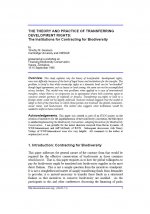The Theory and Practice of Transferring Development Rights: The Institutions for Contracting for Biodiversity
By Timothy Swanson View PublicationThis study explains why the theory of transferable development rights, runs into difficulty because of the lack of legal bases and institutions for the transfer. The problem, in brief is that while ownership rights at a domestic level can be “un-bundled” though legal agreements such as leases or land zoning, the same can not be accomplished across borders. This model runs into problems when applied to a case of international
transfers, where there is no reciprocity (as in agreements where both countries agree to
conserve similar portions of wetlands or forests). Transferring use-rights in land to a foreign entity could not be legally enforced. Swanson instead suggests that the model to adopt is that of the franchise, in which three parties are involved: the global community, owner states, and land-owners. The author also suggests what institutions would be
needed to enforce these contracts.

